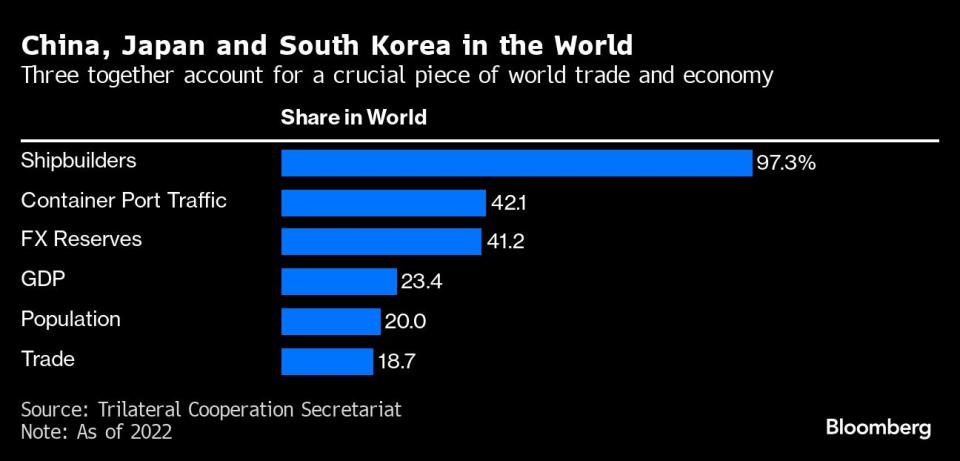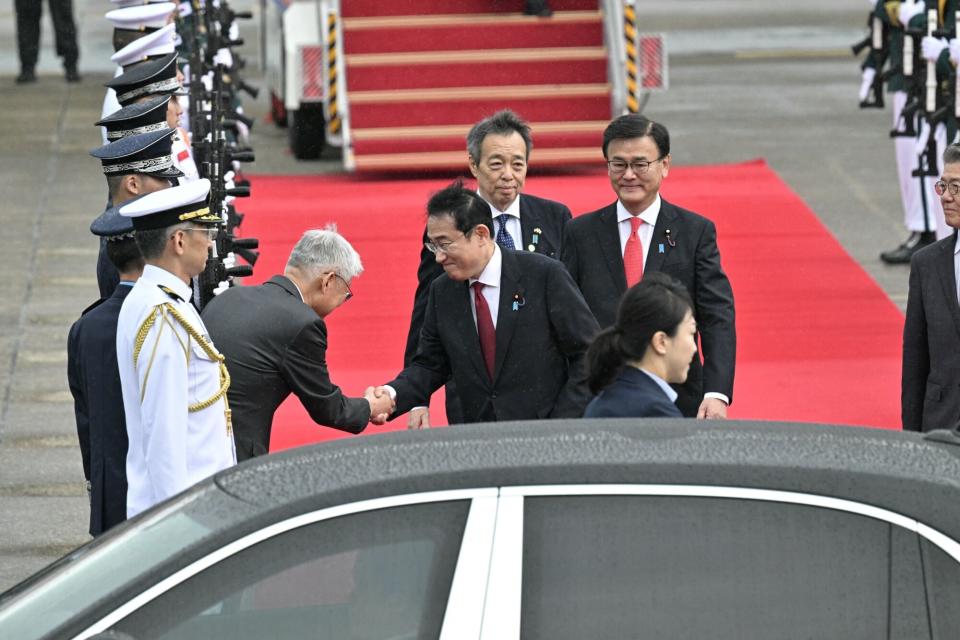China Urges South Korea to Maintain Stable, Smooth Supply Chains
(Bloomberg) -- China asked South Korea to maintain stable supply chains as the countries began their first three-way summit with Japan since 2019, with Premier Li Qiang also meeting the head of Samsung Electronics Co.
Most Read from Bloomberg
Israeli Airstrike and Egyptian Guard’s Death Ratchet Up Tensions
Wall Street Moves to Fastest Settlement of Trades in a Century
Catering to the Ultra-Rich Is a Booming Business in Australia
For Private Credit's Top Talent, $1 Million a Year Is Not Enough
Li told President Yoon Suk Yeol in Seoul on Sunday that China wants the two to be trustworthy neighbors helping the other to thrive, according to a pool report. Li also told Yoon that both sides should avoid turning economic issues into political issues, and that Beijing welcomes South Korean firms including Samsung to expand investment in China, the official Xinhua News Agency said.
Li told Samsung Chairman Jay Y. Lee that China would always remain open to foreign enterprises and pledged to improve the business environment, Xinhua reported. Lee vowed to contribute to mutually beneficial cooperation between South Korea and China, according to Xinhua.
The three leaders had dinner together on Sunday and will meet for a three-way summit on Monday, followed by a session with business leaders after that.
Read more: N. Korea Notifies Japan of Impending Satellite Launch: Kyodo
Japanese Prime Minister Fumio Kishida also arrived in Seoul on Sunday and met with Li and Yoon. The Japanese leader and Yoon agreed to continue the shuttle diplomacy that has symbolized the warming ties between the neighbors, and exchanged opinions on North Korea. They also agreed to speed up green energy cooperation in areas including hydrogen and ammonia.
Kishida’s talks with Li were a bit more pointed as he called on China to free detained Japanese nationals, and raised concern over China’s actions in the East China Sea, where ships from the two sail near disputed isles on an almost daily basis. Kishida told reporters he also asked Beijing to end its ban on food imports from Japan in response to Tokyo’s release of treated wastewater from the Fukushima nuclear site into the Pacific Ocean.
Read more: China Bans Japanese Seafood as Nuclear Wastewater Released
Just before the formal summit, Japan said North Korean has given notice that it plans to launch a rocket to deploy a satellite. Japan, South Korea and the US have said North Korea’s space program helps it develop ballistic missiles and the notice of a launch is set to focus attention on Pyongyang’s weapons program at the trilateral meeting.
The three countries are geographically close, but summits such as this are relatively rare. The leaders were supposed to convene annually but the meeting was on hold for nearly five years due to the pandemic and geopolitical tensions. Tokyo and Seoul have drawn closer to the US during this time, worrying China.
While the summit brings risks and rewards for all three, the stakes are high for China. It’s likely to try and push Japan and South Korea not to join US-led efforts in further restricting exports of advanced chipmaking equipment, after Tokyo imposed export controls last year. Japan has been resisting US pressure to further curb sales to China. The Biden administration is also trying to bring South Korea into the agreement that includes the Netherlands.
“This is an opportunity for China to try to improve relations with Japan and South Korea without the United States,” said Naoko Aoki, an associate political scientist with the Rand Corp. in Washington.
After Yoon took office about two years ago, South Korea saw an improvement in ties with Japan after several years of tensions. The two US allies have stepped up security cooperation with Washington and last year met with President Joe Biden for an unprecedented trilateral summit.
Tokyo and Seoul have also expressed concern about security in the Taiwan Strait, and Kishida said he brought up the subject in his talks with Li. Tensions in the region have risen as China held its most expansive military drills in a year around Taiwan last week, ramping up pressure on the island’s new president, Lai Ching-te, just days after he was sworn in.
Read more: China Holds Biggest Military Drills in a Year Around Taiwan
Beijing, Tokyo and Seoul will seek to cooperate in six main areas when they meet on Monday, including sustainable development, people-to-people exchanges as well as economy and trade. Japan and South Korea have also sought China’s help to rein in North Korea’s atomic ambitions.
“If there are to be any concrete accomplishments this time, I expect that to be on economic and other non-security issues,” Aoki said. “I don’t think the meeting is going to change anyone’s security calculus,” she said, pointing to a significant gulf between Beijing and the other two on issues including North Korea and Taiwan.
Yoon and Kishida may be heading to the US in the next few months, possibly to hold a summit with Biden that will build on the meeting they had about a year ago, according to reports from Kyodo News and other media.
Read more: Five Takeaways From the US, Japan and South Korea Summit
Their meeting last year at the Camp David presidential retreat in rural Maryland included practical steps such as real-time data sharing to counter threats by North Korea, measures to de-risk global supply chains from exposure to China and steps to bind the trilateral relationship so tightly that it would be hard to unravel.
--With assistance from James Mayger, Sam Kim, Daisuke Sakai, Shamim Adam, Phila Siu and Heejin Kim.
(Updates with North Korea notice of satellite launch in paragraph seven.)
Most Read from Bloomberg Businessweek
The Dodgers Mogul and the Indian Infrastructure Giant That Wasn’t
A Hidden Variable in the Presidential Race: Fears of ‘Trump Forever’
©2024 Bloomberg L.P.




